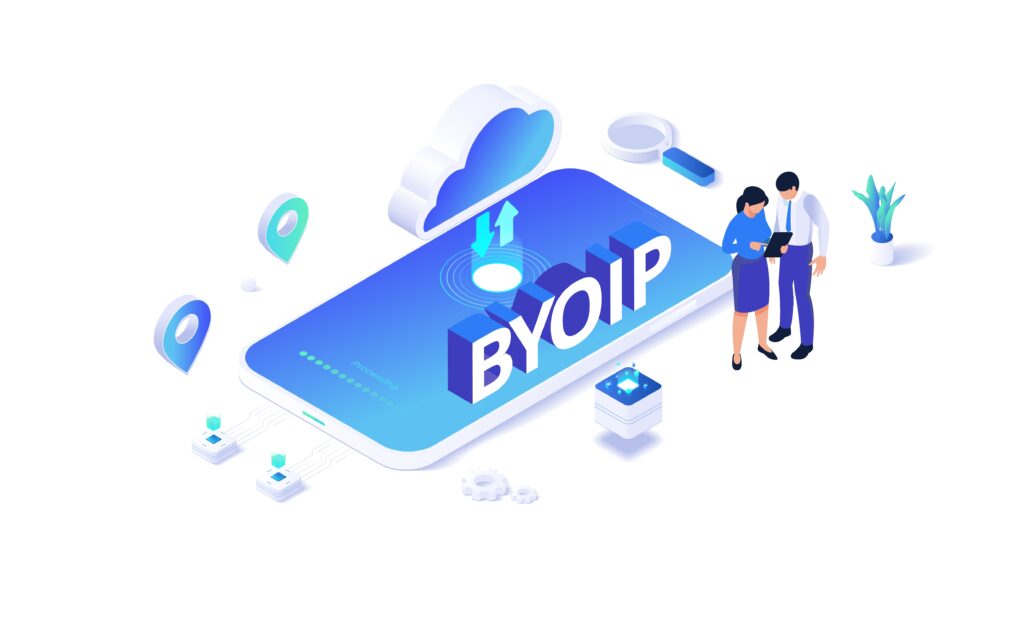6 Min Read |16 March 2024 | Key Words: IPv4 Market, AWS, BYOIP, IPv4 address, Cloud
AWS to Charge for IPv4

AWS announced on July 28, 2023, that starting February 1, 2024, they will charge for every IPv4 address used on their platform. This marks a shift from the previous policy of charging only for reserved but unused addresses. The new rate is $0.005 per hour per IP, totaling approximately $3.66 per month for each address.[1] While this may slightly impact some users, it significantly affects larger organizations with multiple cloud systems.
In response to the rising IPv4 costs, AWS encourages the adoption of IPv6. Meanwhile, the ‘Bring Your Own IP’ (BYOIP) strategy emerges as a cost-effective solution. We will explore how BYOIP can assist businesses in managing their IP resources and costs under AWS’s new billing policy. [2]
What Is BYOIP?
BYOIP (Bring Your Own IP) allows organizations to use their existing IP addresses within a cloud provider’s network, including AWS or Google Cloud.These cloud providers manage the customer’s own IP addresses alongside their own. Key points to note are:
- IPs are exclusive to the purchasing customer.
- No extra fees for these IPs, whether active or idle.
- Overlapping BYOIP route announcements are not supported
Benefits of BYOIP Adoption
Benefits of BYOIP Adoption

BYOIP (Bring Your Own IP) offers significant operational advantages for cloud migration by allowing organizations to use their existing IP addresses in a cloud provider’s network. This ensures seamless compatibility for businesses, especially those with legacy applications or services tied to specific IPs, minimizing the need for extensive reconfiguration. The advantages for cloud migration include:
Smooth Cloud Migration: BYOIP facilitates a more efficient transition by minimizing disruptions and network configuration changes.
IP Ownership Continuity: It helps maintain a company’s digital identity and trust by avoiding the need to rebuild reputation with new IPs.
Application Compatibility: Ensures seamless migration for legacy systems with hardcoded IPv4 addresses, preserving existing IP relationships.
Regulatory Compliance: Assists in adhering to industry-specific IP usage regulations, maintaining legal and operational standards.
Asset Retention and Enhanced Security: BYOIP positions IPv4 addresses as valuable assets potentially offering financial benefits, while simplifying security policy adaptations to the cloud.
The Mechanics of BYOIP Implementation
When the time comes to perform the transfer process involved with migration, an organization must follow several steps:
- Validate IP Addresses: Confirm that your IP addresses are approved by a Regional Internet Registry.
- Work with Cloud Provider: Work closely with your cloud provider, such as AWS or Google Cloud, to plan and execute the migration.
- Configure on Cloud Platform: Use the provider’s control panel to set up the IP addresses on the cloud infrastructure.
- Update Network Settings: Adjust your current network settings to facilitate a seamless transition, including updating registry entries and certificates as necessary.
- Monitor Performance: Continuously monitor and manage your IP addresses after migration, either internally or using external monitoring services.
- Understand Provider Limitations: Be aware that certain cloud providers may impose restrictions on using specific portions of larger IP blocks.
The specific steps can vary depending on the cloud provider, as each has unique infrastructure and requirements. For instance, AWS’s process involves creating a key pair, uploading a self-signed certificate, and configuring a ROA (Route Origin Authorization) object with the RIR.
The process of migrating IPv4 addresses to a new cloud provider varies depending on the provider’s specific infrastructure and requirements. For example, AWS’ involves a detailed two-phase, three-step approach.
Step 1: Preparation Phase
Create an RSA key pair and generate a self-signed X.509 certificate for authentication. IPv4 Superhub assists in meeting cloud provider security standards.
Step 2: RIR Configuration Phase
Upload the certificate to the RIR’s registry and create/update a ROA object, defining address range and ASNs.
Step 3: Cloud Integration and Finalization
Implement the BYOIP configurations within the chosen cloud provider’s platform, ensuring the addresses are correctly set up and operational. IPv4 Superhub offers support in this final step, ensuring seamless integration with the cloud environment while complying with RIR and provider requirements.
Challenges in a BYOIP setup

Implementing BYOIP in cloud environments like AWS EC2 presents challenges, Key aspects include the technical onboarding process, which experienced network engineers can typically complete in less than a day, involving steps like configuring IP addresses with RIRs and creating necessary authorizations and certificates. Additionally, not all cloud providers support BYOIP, which means organizations need to confirm compatibility and adjust to specific provider requirements. These factors make BYOIP a valuable but complex solution that requires careful planning and expertise.
BYOIP with IPv4 Supehub
In the context of “BYOIP in AWS: Solutions for Reducing IP Address Costs,” IPv4 Superhub plays a cruical role. It enables businesses to integrate their own IPv4 addresses into cloud providers’ networks, offering a cost-effective alternative to acquiring new IPs. This BYOIP approach enhances flexibility, control, and efficiency in managing IP assets. For companies with legacy IP addresses that lack migration skills, IPv4 Superhub provides comprehensive services, including appraisal and transfer, streamlining the transition to cloud environments. This strategy not only maximizes IP resource utilization but also maintains the business’s established reputation and compliance with regulation.
If you’re looking to navigate the complexities of cloud migration and maximize the use of your IP assets, consider reaching out to IPv4 Superhub for specialized guidance and services.
